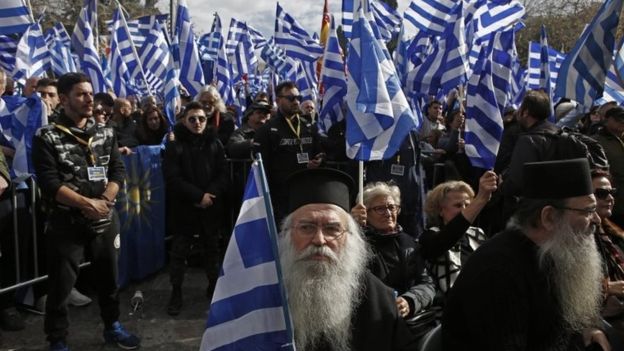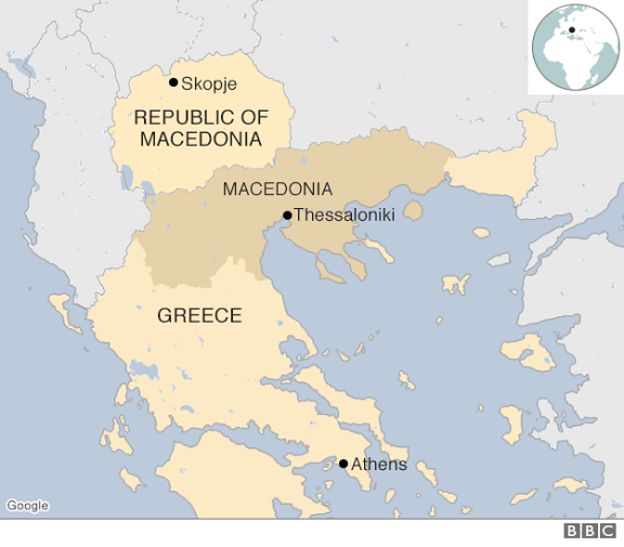Greece protests against Macedonia deal
January 22, 2019 | Expert Insights

Protesters have clashed with police in the Greek capital Athens at a big rally to oppose the government's deal with Macedonia on changing its name. The deal, which is yet to be approved, designates Greece's northern neighbour as the Republic of North Macedonia.
Background
The use of the name "Macedonia" is disputed between the south-eastern European countries of Greece and the Republic of Macedonia, formerly a state within Yugoslavia.
The dispute arises from the ambiguity in terminology between the Republic of Macedonia, the adjacent Greek region of Macedonia and the ancient Greek kingdom of Macedon (which falls mostly within Greek Macedonia). Citing historical and irredentist concerns, Greece opposes the use of the name "Macedonia" by the Republic of Macedonia without a geographical qualifier such as "Northern Macedonia" for use "by all ... and for all purposes".
On 12 June 2018, an agreement was reached between Greek prime minister Alexis Tsipras and his Macedonian counterpart Zoran Zaev, where the Republic of Macedonia could be renamed the "Republic of North Macedonia".
Greece’s ruling coalition was on the verge of breaking as the right-wing coalition partner of Greek PM has threatened to withdraw support over Macedonia’s recently renaming.
The move by Independent Greeks (Anel), a small rightwing nationalist party, had been expected since Panos Kammenos, the defence minister and Anel leader, declared his opposition to Greece’s naming deal with neighbouring Macedonia. Fortunately for PM Alexis Tsipras, his government won the confidence motion and the deal is expected to be signed soon.

Analysis
The name Macedonia is sensitive for many Greeks who say it implies a claim on the Greek province of the same name. Years of wrangling finally brought an agreement last June between Greece's left-wing Prime Minister Alexis Tsipras and his Macedonian counterpart. A vote on the deal, which aims to end a 28-year row between the nations, is set to take place in the Greek parliament this week.
The dispute dates back to 1991 and the break-up of Yugoslavia. Macedonia was a Yugoslav republic and adopted the name Macedonia when it became an independent nation. Greece has long argued the use of the name implied a territorial claim and cultural appropriation. At the UN the country was formally known as the Former Yugoslav Republic of Macedonia (FYROM).
Earlier in January 2019, Macedonia had ratified the deal on the name change to the Republic of North Macedonia. Some members of the Greek parliament have received death threats intended to influence their vote.
Organisers had said as many as 600,000 people were expected to take part in the recent demonstrations. People had travelled from across the country to demonstrate close to the national parliament. Demonstrators in the capital on Sunday chanted, "Macedonia is Greek" and waved Greek flags. A number of clerics, dressed in black, were among those taking part. Greek nationalists argue that the name Macedonia can only refer to the Greek province of the same name.
The dispute has led to Greece to blocking Macedonia's hopes of joining NATO and the European Union. Under the deal, the country's language would be Macedonian and its people are known as Macedonians (citizens of the Republic of North Macedonia).
The move has met with sharp resistance in both countries because nationalists believe it erodes their identity.
Assessment
Our assessment is that the name “Macedonia” hold sentimental value for Greek citizens and the protests are a sign of public disagreement with the Greece-Macedonia deal. We believe that nationalist parties such as Independent Greeks will use this deal as a major focal point of their campaign for the 2019 Greek General Elections.








Comments